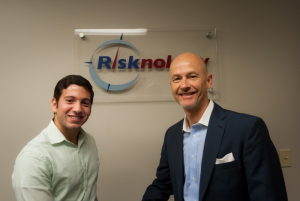For many students, taking a full-time course load of classes like differential equations and thermodynamics is enough to deal with in one semester. For Antonio Cabrales Juan, a sophomore pursuing his B.S. in industrial engineering at the UH Cullen College of Engineering, it wasn’t enough.
This semester, Cabrales began a cooperative education program with Risknology Inc., a risk assessment and process safety firm near the Memorial City neighborhood. Recently, his co-op was extended through the spring 2014 semester.
Co-op programs are a type of internship program that enables college students to receive hands-on career training with pay, according to the Engineering Career Center website. For Cabrales, the biggest benefit he’s received is the understanding of how classroom theories play into real world engineering.
“You get that responsibility of knowing that as small as a number may be, it may make a big difference. It can save a life. It makes you take everything with a great deal of responsibility,” Cabrales said.
Cabrales’ boss and Risknology president Andrew Wolford explained that the company examines the three pillars of risk analysis: anticipating what could go wrong, estimating the chances of those things going wrong, and finally, assessing how bad the damage could be if those things do indeed go wrong. After the BP Deepwater Horizon well blowout in 2010, Risknology served as a consultant to the British oil giant on how to safely and effectively cap the leak.
Now, Wolford says the risk assessment industry is growing in conjunction with what he calls a “real resurgence back to basics.” He says new builds and older plants alike need front end consultations as they’re going through design (or re-design) processes.
Wolford describes their line of work as “keeping hydrocarbons where they belong,” like in contained wells or pipelines, but the real nature of the industry is saving lives. Algorithms and analysis determine the risk of disaster, but ‘disaster’ doesn’t just mean lost money or time. Just like in the Deepwater Horizon disaster, where 11 workers were killed by the blast, the impact of risk analysis can mean the difference between life and death for those working on or around projects. “It’s what motivates us to go to work every day, to have that noble purpose, to know that what we do really matters,” Wolford said.
That fact isn’t lost on Cabrales, either. He said that his co-op with Risknology has helped him to apply the engineering theories he’s learning college to the real world. In his end-of-the-semester summary paper – a requirement of the co-op – Cabrales stressed that before his work experience, he never fully grasped the gravity of some of the decisions engineers make. Now that he’s had first-hand experience with the consequences of poor decision-making, he more completely understands what is at stake: human life.
He also said, thanks to his co-op, he’s now better equipped to take lessons taught in class and relate them to how and where they will fit in to his career once he’s working full-time. “I try to see how [the lessons] might be helpful. For example, in the user guide for the program we use here (at Risknology), all you see is differential equations. At the beginning of the semester I couldn’t understand anything. Now, after the differential equations class, I try to apply what’s being taught and it actually makes much more sense.”
